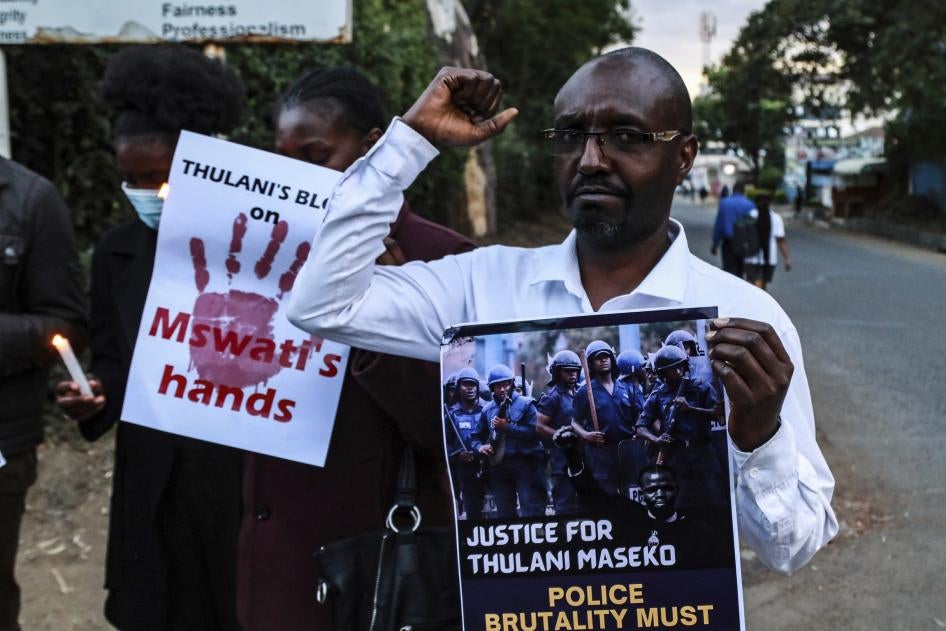(Johannesburg) – Eswatini authorities have failed to ensure accountability for the crackdown on pro-democracy protesters by security forces that began two years ago, Human Rights Watch said today. The crackdown led to the deaths of at least 46 people, as well as other serious human rights abuses.
Since pro-democracy demonstrations began in May 2021, the government of Eswatini has intensified its clampdown on dissenting views by arresting government critics on bogus charges, interfering with peaceful assembly, and resisting calls for democratic reforms. It has failed to conduct a transparent, independent, and impartial investigation into the killings and other human rights violations resulting from the security forces’ excessive use of force. Despite repeated calls by Eswatini’s international partners and other actors for rights reforms, the government has made no progress to address the country’s deteriorating human rights record.
“The protests that began two years ago have been seen as the beginning of a tipping point in Eswatini’s governance, human rights and democratic crisis,” said Nomathamsanqa Masiko-Mpaka, South Africa researcher at Human Rights Watch. “The government needs to realize that the movement for human rights and justice is not going to go away and that it needs to end its repression.”
The government should release critics detained solely for their expression and peaceful assembly, lift the trumped-up charges against them, and conduct independent and impartial investigations into the attacks against pro-democracy activists, Human Rights Watch said.
On May 17, 2021, students and teachers began protesting the alleged killing by the police of Thabani Nkomonye, a law student at the University of Eswatini. The protests escalated on June 20, when about 500 young people took to the streets in Manzini to demand democratic reforms. In response, the authorities banned all protests and deployed security forces, who shot at protesters indiscriminately with live ammunition.
In July 2021, the authorities arrested two members of parliament, Mduduzi Bacede Mabuza and Mthandeni Dube on spurious charges of terrorism for allegedly supporting pro-democracy protests and calling for democratic reforms. The government also charged them with two murders.
While in detention, the parliament members have been beaten and denied access to lawyers and medical care, Amnesty International reported. Their trial concluded on January 31, 2023, and on June 1, they were found guilty of all charges against them, including murder and terrorism. Mabuza and Dube, who pleaded not guilty to all counts, face up to 20 years in prison. A sentencing date is yet to be announced.
The murder judgment relates to the death of two men, Siphosethu Mntshali and Thando Shongwe who were hit by a car on June 29, 2021, at one of a number of roadblocks around the country where residents were stopping vehicles and demanding money. However, the parliament members were not there or at any of the roadblocks, their attorney said.
The charges were apparently brought because the parliament members supported the June 2021 protests. The conviction was largely based on the concept of dolus eventualis (foreseeability), a judgment that many have questioned as not accurately applying the law. “The judgment is a deliberate failure on her part [Judge Mumcy Dlamini] to understand the concept of murder dolus eventualis,” an Eswatini human rights lawyer said.
On October 20, 2021, police fired live ammunition and teargas into a bus full of people traveling to Mbabane to protest Mabuza and Dube’s incarceration. On January 31, 2022, media reported that security officials beat and kicked a university student, Colani Maseko, as they arrested him while he participated in protests at the University of Eswatini’s Kwaluseni campus, sparking a new wave of protests.
The Eswatini government has failed to ensure a meaningful investigation of the security forces use of excessive force during the protests and the crackdown on democracy activists, or of the killing of a prominent human rights lawyer and pro-democracy activist, Thulani Maseko by unidentified men on January 21, 2023, despite repeated calls by Eswatini’s regional and international partners. Political dissent and civic and labor activists are subject to harsh punishment under the Terrorism Act of 2008 and the Sedition and Subversive Activities Act of 1938.
On September 29, Eswatini will hold general elections as part of the country’s Tinkundhla constituency system, under which political parties are banned from participating and nearly all individual candidates are loyal to the king and have his support. King Mswati III exercises absolute authority over all branches of national government and controls local governance structures through his influence over traditional leaders.
Political parties have been banned in the country since 1973, but banning political parties does not meet international standards for the conduct of democratic elections. It violates the fundamental right to freedom of association and to participate freely in the government of one’s country, either directly or through freely chosen representatives, as protected by the International Covenant on Civil and Political Rights and the African Charter on Human and Peoples’ Rights.
“It is unlikely that the upcoming elections will bring any meaningful change,” said Arnold Tsunga, a Southern African human rights defender, to Human Rights Watch. “There is no election,” he said. “It is a charade. People are treated as subjects and not as citizens who have the right to elect and hold public officials to account.”
However, as noted by retired Judge Dhaya Pillay of South Africa during her keynote address at the Inaugural Thulani Maseko Memorial Lecture on June 21, 2023, “Eswatini shall not be at peace until democracy prevails.”
Regional bodies such as the Southern African Development Community (SADC) and the African Commission on Human and Peoples’ Rights should actively monitor human rights developments in Eswatini and press the Eswatini government to undertake needed human rights reforms. The Special Envoys established in 2021 by President Cyril Ramaphosa of South Africa in his capacity as chairperson of the SADC Organ on Defense, Politics, and Security, have not shown any sustained engagement or concrete progress in mediating the crisis in Eswatini.
The Eswatini government should review the 1973 decree that dissolved and banned political parties in the country and allow parties to freely participate in elections. The government should release all political prisoners. It should conduct independent and transparent investigations into the killings and other abuses against all pro-democracy stakeholders and hold those responsible to account.
“Justice for victims of extrajudicial killings and other human rights violations has remained elusive and impunity is entrenched,” said Masiko-Mpaka. “With elections around the corner, the government should initiate the establishment of the all-inclusive national dialogue where all Swazi people can collectively deliberate on the democratic future of the country.”







